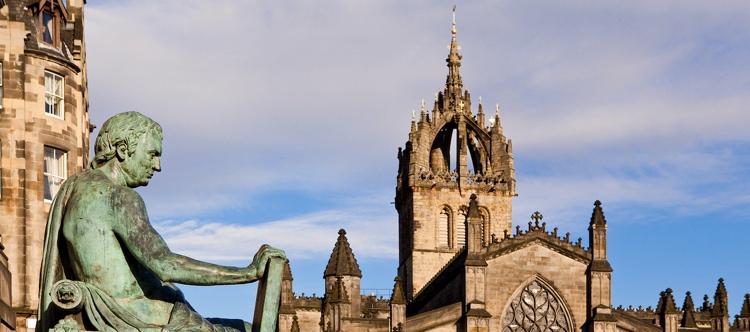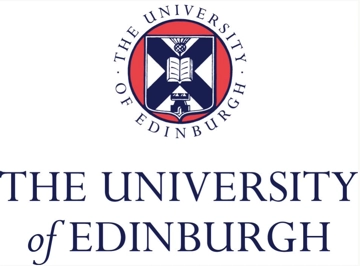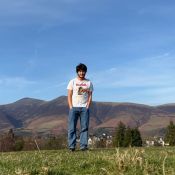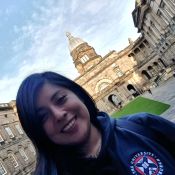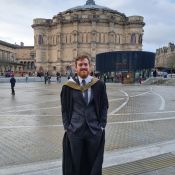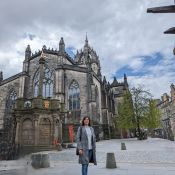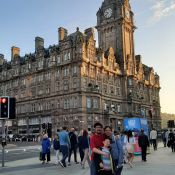University of Edinburgh
The University of Edinburgh is one of the foremost universities in the world. For more than 400 years, students and staff at Edinburgh have been influencing and changing the world for the better. From unlocking the secrets of the universe to cloning sheep to building robots and devising technology used in today’s smartphones, as a student at Edinburgh you will learn from world-leading researchers. Based at the heart of Scotland’s stunning capital city, not only will you will benefit from a transformative learning experience but a cultural one as well, creating lasting memories in one of the world’s great student cities.
STUDY AT THE UNIVERSITY OF EDINBURGH
Edinburgh’s world-class academics are leaders in their fields, conducting cutting-edge research that directly informs the teaching you receive. This research-led teaching means your lecturers can incorporate their latest research in the teaching you receive, allowing them to share their discoveries.
For you, this all starts with the possibilities offered by almost 400 degrees across 60 different subjects, covering the arts, humanities and sciences. Many of these are joint honours degrees, offering the potential for innovative cross-disciplinary subject combinations, preparing you to be a leader in your field in the future. A great example of this inclusive and participative environment is the four-year undergraduate degree, Interdisciplinary Futures, which brings together teaching from a wide range of subjects with a focus on global and local challenges, allowing you to apply your learning to ‘real life’.
The University has an impressively diverse range of award-winning sustainability experts and educators, bringing people together from across the world to understand the problems caused by issues like the changing climate, simultaneously working with local communities, businesses and governments on solutions.
Values guide Edinburgh’s work. You’ll find progressive sustainability action across the University’s operations, enterprises, and partnerships. On campus, the University will be zero waste by 2030 and carbon neutral by 2040. There are also ongoing projects to increase the biodiversity of the University’s beautiful greenspaces.
HISTORY OF THE UNIVERSITY OF EDINBURGH
Scotland's largest university was established in 1583 as the fourth university in Scotland. By the 18th century, Edinburgh had established itself as a leading centre during the European Enlightenment, and became one of the continent's primary universities. It is one of six "ancient universities" in the United Kingdom, having laid the foundations of modern economics and sociology, geology, English literature, quantum mechanics, electromagnetism, thermodynamics, antiseptic surgery, nephrology and the theory of evolution.
SPECIALIST AREAS AT THE UNIVERSITY OF EDINBURGH
Research excellence underpins everything at Edinburgh. The university created the first genetically modified hepatitis B vaccine, the first assembly robot for industrial use, the hypodermic syringe, the kaleidoscope, the vacuum flask, the ATM, the diving chamber and in-vitro fertilisation. It has advanced the public understanding of how our behaviours affect ageing, protected forest ecosystems, and helped bring broadband to remote communities.
The University community has long enjoyed a spirit of innovation and continues to do so today. Working with partners across the world and building on significant strengths in data science, Edinburgh aims to establish the region as the data capital of Europe. The University is also working towards other historic firsts including new treatments for major diseases such as multiple sclerosis, motor neurone disease and cancer; and doing innovative work to tackle climate change.
Many of the University’s degrees take four years to complete. Studying a four-year degree allows you to benefit from greater flexibility and choice during your studies than might be offered in a shorter degree elsewhere. On most degrees in the arts, humanities, engineering, science, and social sciences, you’ll be able to study a range of subjects in Years 1 and 2 before you decide which area to specialise in for your final two years.
LIFE ON CAMPUS
The University has multiple campuses across the city so effectively the city of Edinburgh is your campus! Luckily, Edinburgh is compact and very easy to get around. Most students will either walk or cycle to classes during the semester or take advantage of the city’s excellent bus network.
The largest campus is at our Central Area, located in the heart of the city’s medieval Old Town, principally housing humanities students. Surrounded by museums, galleries, cafes, restaurants, and shops, you’re only a short walk from the city centre. The Edinburgh College of Art and Moray House School of Education and Sport are also close by. The majority of Science students are based at our King’s Buildings campus, two miles to the south of the Central Area whilst our Medical and Veterinary Schools each have their own campuses on the outskirts of the city.
All of the University’s campuses benefit from lots of green space, cafes, shops, dedicated libraries and study space. You will also not be far from one of the city’s many, many cultural attractions and shopping areas.
STUDENT SUPPORT AT THE UNIVERSITY OF EDINBURGH
The University offers a wealth of support for international students, including:
Health and Wellbeing. Our wellbeing support includes the University Health Centre and independent Pharmacy, Disability and Learning Support Service, Student Counselling, and the Student Wellbeing Service. All the services are based in and around the University’s award-winning Health & Wellbeing Centre in Bristo Square, which includes a wellbeing lounge for quiet time on campus.
The Chaplaincy is a safe and welcoming service for people of all faiths and none. Offering mindfulness sessions, yoga classes, and a multi-faith sanctuary.
Peer support. The Students’ Association supports numerous student-led peer learning and support schemes across the University to help you settle in to your studies. The Association provides professional, independent and confidential advisory support to students on money matters, accommodation, academic issues and much more through the Advice Place.
Academic support. The University will support you with a combination of academic and dedicated student experience and administrative staff who will be able to direct you to the appropriate support for any challenges you face, whether directly related to your learning and teaching or arising from life situations.
Technical support. On campus and online, EdHelp provides straightforward access to key services where you can find answers to common support questions and raise any issues with the team. They will work with areas across the University – including student administration, finance, the libraries, and information services (IT) – to help you resolve these.
The Student Immigration Service has a dedicated team of advisers who offer visa information and advice in a professional, friendly and confidential manner, as well as comprehensive visa web pages that will help you prepare for the process.
UNIVERSITY OF EDINBURGH FACILITIES
The University boasts cutting-edge facilities and remarkable historical buildings across its 21 academic schools.
The Main Library is one of the largest and most important academic libraries in the world and is open 24 hours a day, seven days a week. In total, the University has 10 libraries holding more than two million printed volumes and providing access to almost 700,000 electronic journals and databases.
uCreate – Makerspace, Multimedia and Loans. Equipment, advice and training offered for the whole university community.
The Centre for Research Collections is unique, bringing together more than 400,000 rare books, from Shakespearean first editions to oriental manuscripts, as well as six kilometres of archives, and museum-standard collections of art and artefacts.
The FloWave Ocean Energy Research Facility is the world’s most sophisticated simulator of wave and tidal current interactions. Its 25-metre diameter circular tank holds 2.4 million litres of water. The University is also a founding partner of FastBlade, the world’s first rapid testing facility for tidal energy turbine blades.
St Cecilia’s Hall, built in 1762, is Scotland’s oldest purpose-built concert hall. It now houses the University’s Collection of Historical Musical Instruments – one of the world’s most important collections of musical heritage with 5,000 objects spanning 500 years.
Edinburgh Imaging is one of Europe’s foremost clinical research imaging facilities. It sits alongside one of the UK’s largest state-of-the-art teaching hospitals and the world-leading MRC Centre for Regenerative Medicine, where they are studying stem cells and developing new treatments for cancer, heart disease, liver failure, diabetes, multiple sclerosis, Parkinson’s and motor neurone disease.
The Bayes Centre brings together world-leading mathematical, computational, engineering and natural sciences expertise in a data science and artificial intelligence innovation hub to work across disciplines applying data technology to solve real-world problems.
The Edinburgh Climate Change Institute (ECCI), Scotland’s leading climate action hub for research, teaching, policy and practice, and the Edinburgh Earth Initiative, which works to accelerate interdisciplinary research, partnerships, teaching, and innovation for the climate and environmental emergency.
Other facilities include state-of-the-art laboratories and world-leading analytical facilities including an Eco Diamond HK36 small aircraft for measuring trace gases at 3,000 metres.
A £100m investment created a European centre of excellence in animal services and food security on the Easter Bush campus. The campus also has small animal, large animal and equine hospital facilities at the Royal (Dick) School of Veterinary Studies, which was founded in 1823, and hosts one of the UK’s 10 Wellcome Trust clinical research facilities.
The University’s Institute for Astronomy, based at Edinburgh’s historic Royal Observatory, is one of the UK’s major centres of astronomical research, with special strengths in survey astronomy, cosmology, active galaxies and the formation of stars and planets.
The University’s Anatomy Museum, first opened in 1884, has a wealth of unique anatomical objects, whilst the Talbot Rice Gallery and Tent Gallery host public contemporary art exhibitions throughout the year.
SPORTS AND SOCIETIES AT THE UNIVERSITY OF EDINBURGH
The University has long been recognised as one of the UK’s leading sporting universities, consistently finishing in the top four of the British Universities and Colleges Sport (BUCS) rankings. The Performance Sport Programme for elite athletes is one of the most highly regarded in the UK.
With more than 65 sports clubs made up of more than 200 teams, the University offers something for everyone. There are opportunities for beginners through to athletes competing on an international stage.
Sports clubs offer regular coaching, training, trips and competition, both locally and nationally, with opportunities to participate most days of the week. They run Scotland’s largest intramural sports programme, offering leagues, tournaments and fun events for students looking for a more informal sporting experience.
They also cater for those looking to try new sports and experience a range of sessions through recreational sport and EDex offerings. As well as delivering sports-related volunteering and skills development opportunities through the Coaching and Volunteering Academy, which is open to all Sports Union students, volunteers and coaches.
In addition to state-of-the-art sport and fitness facilities across each of our campus gyms, the University offers an indoor climbing and bouldering centre, a 25-metre swimming pool, Peffermill Playing Fields (one of Scotland’s leading outdoor sports facilities, with international-standard, floodlit, water-based artificial pitches), and Firbush Outdoor Centre, on the banks of Loch Tay in the Highlands, offering tailored activities and services, from windsurfing to mountain leadership training, with fully-accredited, experienced instructors and all specialist equipment.
As soon as you join the University, you’ll be welcomed into the Edinburgh University Students’ Association, which works on your behalf to ensure you have the best possible experience during your time in Edinburgh.
The Students’ Association is led by five elected student sabbatical officers and supports a Student Council which all students can participate in. You will be represented by elected school and programme representatives. They include black and minority ethnic, disabled students’, LGBT+, trans and non-binary, and women’s officers. There is also an International Students’ Representative.
The Students’ Association supports more than 400 student-led societies and volunteering groups, from the Trading and Investment Club, Europe’s largest student-run investment fund, to the Women in STEM as well as numerous international and multicultural groups.
Facilities include a thriving centre for student activities at the iconic Pleasance complex, which includes dance studios, a multipurpose performance space, TV and radio production facilities and a cafe and bar. Students’ Association deliver hundreds of events throughout the year; from language cafes to silent discos and from ceilidhs (traditional Scottish gathering involving lots of dancing – hugely fun!) to food fairs.
Teviot Row House, opened in 1889, is the oldest purpose-built students’ union in the world. It sits in the Central Area, next to the unique, domed, Potterrow venue. On the King’s Buildings campus, the Students’ Association provides a coffee bar and a cafe, common room spaces and a wrap bar and shop.
ACCOMMODATION AT THE UNIVERSITY OF EDINBURGH
Edinburgh has over 9,000 student rooms in both historic and modern facilities. Consequently, we can guarantee university housing to international students in their first year. All residences are centrally located offering a range of catered and self-catered options.
Edinburgh was the first university in Scotland to win the Food for Life and Food for the Brain awards – which means you will have a healthy and balanced diet in the university buffet. If you do not want to have meals included and rather cook yourself, there are many other rooms to choose from.
All our students have access to our Residence Life team, Residents’ Assistants and Wardens who live with you in your accommodation. They offer a full range of events and activities to help you settle in to life in Edinburgh and to create a supportive and inclusive community in which to live.
INTERNATIONAL FOCUS
The University of Edinburgh is one of the largest universities in the UK, comprising around 46,000 students (26,000 at undergraduate level; 20,000 at postgraduate). It is also one of the most international. Students from 180 different countries have studied at Edinburgh in the last 10 years. Currently, around 45% of students are from outside of the UK.
International students are warmly welcomed at Edinburgh. Global Buddies is a peer support scheme on offer to all incoming international students to help all of you adjust to Edinburgh. The scheme is run by student committee with support from the Global Students Team at the Students' Association. They support thousands of students to make their first connections and welcome them to Edinburgh.
The University also offers a wide range of language courses should you wish to broaden your international outlook further. This includes beginner Open Language courses, which are free to all University of Edinburgh students. You can take one at any stage of your undergraduate or postgraduate programme.
INTERNATIONAL STUDENT PERSPECTIVES
“It can be hard to fit in at first but people here are so friendly. They are literally from all over the world – I’ve met someone from all six inhabited continents at Edinburgh – and from all walks of life. You learn a lot outside the classroom about where people are from and their home cultures. I can’t even begin to describe how it feels to wake up in such a beautiful city surrounded by people from so many different cultures.” Elizabeth, USA (MA Scandinavian Studies and History)
“My programme is preparing me for my future career by addressing issues from many different perspectives, which is necessary in our globalised world, as well as presenting me with opportunities to volunteer and go abroad.” Manisha, Luxembourg (MA Health, Science and Society)
“By the time I had chosen the University, I did not feel any trepidation at going into an unfamiliar environment. I already felt part of the community.” Anais, France (LLB Law)
INDUSTRY CONNECTIONS
The University’s global links offer you possibilities for fieldwork, networking and industry placements, and our research-led, industry-informed teaching incorporates the latest developments in your field.
Edinburgh is also an entrepreneurial city, home to two of the UK’s $1 billion-valued unicorn companies. It’s an environment in which Edinburgh Innovations, the University’s commercialisation service, is pivotal.
You’ll join one of the UK’s most entrepreneurial student bodies. In 2021/22 our student startups secured more than £30 million in combined investment and each year, the University helps form over 100 startup companies.
“I’d recommend students get involved with Edinburgh Innovations. They offer practical support to make your business a reality. My sound design software, Dehumaniser, is now used by industry professionals, including Hollywood film studios.” Orfeas, Greece (MSc Sound Design)
STUDY ABROAD OPPORTUNITIES
The University of Edinburgh is one of the world leaders in international student exchanges, offering more than 1,400 opportunities to study abroad across 300 different destinations. Exchanges are possible on many degrees – the options open to you depend on what you’re studying. The University’s exchange partners include a broad geographical spread of institutions. Within Europe, these include the Universities of Bologna, Amsterdam, Sorbonne, Copenhagen, and FU Berlin. Worldwide, partners include the Universities of Sydney, Pennsylvania and Toronto, the National University of Singapore and Seoul National University.
Securing a place can be competitive, though – you will usually apply during Year 2 then study abroad in Year 3. Most students go abroad for the full year but shorter semester-only options may also be available in some subject areas.
EMPLOYABILITY AND CAREER OPPORTUNITIES
The University’s award-winning Careers Service provides tailored advice, individual guidance and personal assistance, internships and networking opportunities with employers from local SMEs to top multinationals, and access to the knowledge and experience of a worldwide alumni network.
A lot of what you do outside university also contributes to your development as a more rounded individual. This might include extra-curricular activities such as running a club or society night, volunteering or part-time work. The Edinburgh Award is the University’s way of recognising, certifying and demonstrating to employers the skills and attributes you’ve gained from your extra-curricular activities.
“Edinburgh is one of the top campuses that we target for recruitment. If you are looking for a university that will give you the skills and experiences to have a successful career, then Edinburgh is a good place to start.” Proctor & Gamble
STUDY IN EDINBURGH
Scotland’s inspiring capital will be the backdrop to your studies. One of Europe’s great cultural hubs and a stimulating place to study, Edinburgh is an irresistible blend of history, natural beauty and modern city life.
Sometimes known as ‘the Athens of the North’, Edinburgh is a city of stunning, historic architecture and is home to two UNESCO World Heritage Sites.
Large enough to offer something for everyone, but small enough to feel like home, Edinburgh is a modern, sophisticated and beautiful European city with a diverse multicultural community. Well known for its friendly people, delicious international cuisine, its safe, green environment and its compact size, Edinburgh is easy to get around and get away from it all – wherever you are in the city you are never far from open countryside.
Edinburgh’s location is perfect for adventurers, with diverse and readily accessible opportunities from snowboarding to surfing. A single day could see you hillwalking in the morning, lazing on the beach in the afternoon, and enjoying the treasures of the medieval lanes and Georgian streets by night.
Known as the ‘Festival City’, Edinburgh hosts 30 international arts festivals each year, which attract almost four million visitors to the city, and many of them take place either on campus or near to the University making for a vibrant addition to student life.
Around 100,000 students call Edinburgh home, giving the city a unique buzz and ensuring you’ll be in good company. The friends you meet, places you discover and the lasting memories you create will contribute as much to your university experience as your formal learning.
WHY STUDY AT THE UNIVERSITY OF EDINBURGH
“Amazing course content, a city which redefines beauty, and a world-class university – that’s a no-brainer!” Abesh & Varun, India (MSc Acoustics and Music Technology; & MSc Sound Design)
